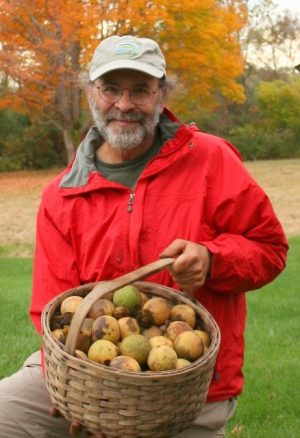Webinars
Virtual Pollinator Habitat Workshop
OnlineIn partnership with MassWildlife, the New England Chapter of the Wildlife Society is hosting a free, public webinar on the Conservation and Management of Native Pollinator Habitat. The workshop also offers 2 CEU credits toward professional collection CEUs toward professional…
Winter Seed Sowing Workshop
OnlineJoin the Wild Seed Project for a free online winter seed sowing demonstration. Wild Seed Project's Seed Program Director, Emily Baisden, will demonstrate each step of sowing native seeds and talk through best practices and where to find the materials…
Bark: Identifying Trees in Winter
OnlineJoin Michael Wojtech, author of Bark: A Field Guide to Trees of the Northeast, to sharpen your tree identification skills and learn how to identify New Hampshire trees by their bark alone. January 18 5:30 to 6:30 p.m. via Zoom.…
Massachusetts Climate Impacts & Solutions – Conserving Nature Close to Home Series
OnlineHow can you make the world a better place for people and wildlife? This free online series by Mass Audubon will explore what you can do in your community to address climate change by supporting nature. Learn how climate change…
New Hope for Ash: Breeding EAB-Resistant Trees
OnlineThe emerald ash borer (EAB) is an invasive beetle that has decimated ash trees throughout North America, dramatically changing the face of our forests — but new research offers hope for the future of ash on our landscape. Join Rachel…
Energy Efficient Homebuilding and Retrofitting Workshop
OnlineEnergy Efficient Homebuilding & Retrofitting Workshop on February 6th Egremont, MA -- The Egremont Green Committee invites area residents to attend a climate action webinar on Tuesday, February 6, 2024, 5:30-7:30 p.m. via Zoom. The free, virtual event, entitled “Eergy…
Dam Busters 101: Assessing Local Impacts Both Historic and Indigenous
OnlineLearn about assessing local impacts from a historic and indigenous perspective. Mass Rivers Alliance, along with the Massachusetts Division of Ecological Restoration, and the Charles River Watershed Association, is pleased to present a series of monthly, lunchtime webinars on a…
Meadowmaking for Beginners
OnlinePart of Grow Native Massachusetts' Evenings with Experts series Meadow-style plantings are becoming increasingly popular, particularly as an alternative to the lawns that cover tens of millions of acres in the U.S. Our turf monocultures have many detrimental environmental impacts,…
LEARN! All About Beavers
OnlineJoin this BNRC-hosted online event with MassWildlife Biologist Nathan Buckhout to learn about the life history of beavers in Massachusetts and their past and current statuses. Nathan will touch on human-beaver conflict and some of the laws surrounding beaver management…
In the Life of Threatened Fireflies
OnlineThere is more to fireflies than just summer sparkles! Join endangered species conservation biologist Richard Joyce for a presentation about the fireflies of the USA, focusing on the natural history and conservation needs of our most threatened species. He will…
From the Frontline: Petrochemicals, Plastics, and Cancer Alley PPC Webinar
OnlineFebruary is Black History Month in the U.S., and despite major social justice wins over the last few decades, systemic racial and class injustices unfortunately continue to impact the lives of historically underserved groups. The serious consequences are clear: In the U.S., low-income, rural, Black, Indigenous, and…
Mosses & Lichens: A Winter Wonderland
OnlineWinter is a perfect time to focus on the tiny greenish things in the world, such as mosses and their relatives and lichens. These small organisms capture our attention and invite us to take a closer look. Join Vermont Land…
The Science of Saw-whet Owls
OnlineSmall, secretive, and nocturnal, Northern Saw-whet Owls (Aegolius acadicus) are one of the most common – and most elusive – owls in Northern forests. In the fall of 2022, the Harris Center established a saw-whet banding station on SuperSanctuary lands as part…
Nibbling on Native Plants in Your Backyard and Beyond with Russ Cohen
OnlinePresented by Lexington Living Landscapes and Cary Memorial Library. Native plants aren’t just for insects; many people find them delicious too! Plants that can nourish both groups provide an additional incentive for us to plant them in our yards and…
Nature by the Yard – Conserving Nature Close to Home Series
OnlineHow can you make the world a better place for people and wildlife? This free online series by Mass Audubon will explore what you can do in your community to address climate change by supporting nature. Learn how climate change…
Pollinator Conservation 101
OnlineLearn the basics of pollinator conservation and activities you can engage in to help pollinators, like building a bee friendly garden and signing a pollinator pledge. Registration Required DATE: Wednesday, March 6 TIME: 9:30 AM - 10:30 AM LOCATION: Online
Dam Busters 101: Engineering and Design
OnlineWe’ll go over the many steps in the design process including preliminary designs, pre-removal assessments, removal of the dam itself, and how to manage site and permit issues. Mass Rivers Alliance, along with the Massachusetts Division of Ecological Restoration, and…
The Secret Lives of Native Bees
OnlinePart of Grow Native Massachusetts' Evenings With Experts series You’ve probably heard “Save The Bees!” but do you know which bees need saving? Over 4000 species of bees inhabit North America, and most don’t live in hives or make honey.…
Crossings: How Road Ecology is Shaping the Future of Our Planet
OnlineRoads are so ubiquitous that they’re practically invisible to us, but wild animals experience them as entirely alien forces of disruption. Join the Harris Center for a special evening with award-winning environmental journalist and author Ben Goldfarb as he discusses…
Managing for Biodiversity
OnlineThe “little things that run the world” are in big trouble: insect populations are plummeting, and many species are headed for extinction. This insect species decline has big implications for our food systems, ecology, and biodiversity. The good news is that…












